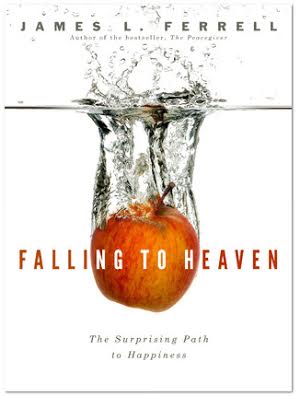The following is an excerpt from the book, Falling to Heaven: The Surprising Path to Happiness, by James L. Ferrell. We will share one chapter or excerpt, with permission, each week.
To see the previous chapter, click here.
 Think of two people: one who keeps all but one of the commandments, and another who keeps only one. I have sometimes posed this situation to people and then asked the following question: Which of these people is betterin other words, closer to God, to heaven, to salvation?
Think of two people: one who keeps all but one of the commandments, and another who keeps only one. I have sometimes posed this situation to people and then asked the following question: Which of these people is betterin other words, closer to God, to heaven, to salvation?
An interesting discussion normally follows. People want to know which commandment the first person failed to keep, for example, and which single commandment the second person kept. And they ask whether the second person even knew about the commandments he or she was failing to keep; for surely one wouldnt be responsible for things one didnt know, they reason. And so on.
These are interesting factors to consider. But I find it even more interesting that Jesus tries to free us from any concern about these issues. Think about some of his parables. The laborer in the vineyard who came at the end of the day received the same compensation as those who had worked from the beginning. (Who was “better” in that case?) The “sinful” son was admitted into his fathers house, while the apparently righteous one kept himself from entering. (Who was the better one then?)
The reviled Samaritan was positioned as the one to emulate, while the pious believers were used as examples of sin. On another occasion, when the disciples were disputing among themselves who should be the greatest, Jesus corrected their impulse to compare themselves one to another by saying, “If any man desire to be first, the same shall be last of all.”
So what does this mean regarding the question of which of these people is best? I believe it means that there is something deeply wrong with the question. The clearest statement I know that gets to the heart of what is wrong with the question is in the book of James, the second chapter and tenth verse. It is perhaps the most astonishing verse in all the scriptures. Here is what James writes:
For whosoever shall keep the whole law, and yet offend in one point, he is guilty of all.
The verse takes my breath away. You might read it again just to take in what he is saying. What he says cant be right, can it? It cant be the case that a person who keeps the whole and entire law save one point is nevertheless by that single transgression just as guilty as the person who keeps none of the law! That cant be right, can it?
Two analogies might help us to understand Jamess point. Here is the first: We are like passengers in individual lifeboats, all of which have holes in them of our own making. The holes in some of the boats are larger than those in others, and some boats have more holes and others fewer. But no matter the size or number of the holes in our boats, the terrible truth is that each of us is sinking.
If these holes represent our sins, then we can also say that no matter the size or number of our sins, each of us is separated from God. This is not to say that all sins are of the same magnitude. It is to say, however, that all sins, of whatever magnitude, will keep us from God. (After all, it took only one transgression for Adam and Eve to be cast out of the Lords presence.) This means that each of us needs the Savior as much as anyone else does.
Whether one transgression or ninety and nine, our predicament is the same. This, I believe, is what James was referring to when he said that transgressors of the law of any and every stripe are, in effect, guilty of all, for even as the result of one transgression we suffer the full effect of the law, which is separation from God. Paul taught this same truth: “What things soever the law saith, it saith . . . [so that] all the world may become guilty before God.” Notice how Paul says “all the world”the keeper of the ninety and nine as well as the keeper of the one.
On the surface, this may seem like a harsh doctrine. However, I have come to believe it to be one of the most merciful aspects of the gospel. Why is being, in effect, “guilty of all” a merciful truth? Because it rescues us from two debilitating temptations. First, it exposes the folly of thinking ourselves better than others. If we are all sinking from holes of our own making, is there really any solace to be found in the idea that I am sinking more slowly than my neighbor? The gospel, Paul taught, removes all reasons for boasting. And this is by divine and merciful design.
How much would our patience and love one for another increase, for example, if each of us could remember the simple, merciful truth that no matter what others may have done or failed to do, we are just as separated from God as they are.
Wouldnt this invite us to be more welcoming of others, less judgmental, and more forgiving? Wouldnt it forever expose the absurdity of the pride that says we are better, and instead invite us to appreciate and love one another? Wouldnt it keep our minds on the only thing that really mattersour own equal and complete need for a Savior?
There is another temptation that is rendered powerless by this truth. It is the temptation to get down and depressed at the thought that we are worse than others. Whatever I may have done or failed to do, I am no more separated from God than anyone else. Perhaps I have kept only one law while my neighbor has kept ninety and nine. The gulf that remains between each of us and God is nevertheless infinite. I need to do exactly what my neighbor needs to do: repentantly fall down before the Lord and rely on his merits to save.
What each of us must specifically do while spiritually kneeling before him may vary. If the holes in my boat are larger than those in anothers, for example, there may be more people to whom I need to reach out. It may mean that the Lord will need to apply more material to the wounds in my hull. And that process may hurt. But there is no wound that he cannot heal, no gap that he cannot cover, no weakness that he cannot make strong, and no hole that doesnt need his infinite Atonement. If I had to be forgiven of more, the Lord says that I will ultimately love him all the more.94 So the question that matters is not how large are the holes in my boat, or how many, but whether I am willing to acknowledge and allow the Lord to fix them.
Another analogy might help to complete the picture, this one a very interesting truth about light. It turns out that no matter our speed relative to light, light always moves toward or away from us at the same constant speed of 186,282 miles per second (the “speed of light”). Aside from the insane rate of speed, this may not sound like a big deal, but if we put it in simpler terms, this truth about light becomes quite bizarreand illuminating as to Jamess message. To see just how bizarre and illuminating, lets think about what normal experience teaches us.
When I was growing up, my grandparents lived on a ranch about ninety minutes from my home. Most Saturdays, my father and I would drive to the ranch to move sprinkler pipe, fix fences, and help tend to the horses. The large, timbered entrance to the ranch stood at the end of a half-mile-long dirt road that paralleled Interstate 90 in eastern Washington. I used to stand at the freeway fence begging truckers to honk their horns by raising my arm and tugging down on an imaginary rope. To my delight, most of them obliged. Those trucks barreled past me at about seventy miles per hour, their horns blaring. I loved it. I used to do the same thing when I rode in cars next to those trucks. If we were doing sixty-nine miles per hour and the trucks were doing seventy, they would honk as they inched past us.
Thats all well and good, you might be thinking, but what does this have to do with light? Well, if instead of watching trucks along I-90, I was actually watching beams of light go by, my experience would have been very different. I might not have noticed the difference while I stood along the highway, as the beams of light would have passed by me at their full speed, just like the trucks did (although incredibly faster!). But I would have noticed a most curious thing had I tried to catch one of those beams of light.
Lets just imagine that my fathers car, with some otherworldly modifications, could manage a top speed of one mile per hour less than the speed of light. In that case, you might expect that the beam of light in the next lane would slowly reach and inch past us, just like the trucks, its relative speed being merely one mile per hour more than ours. But that would not have been our experience. Instead, the beam of light would have roared past us as if we were standing still even though our speed was just one mile per hour less than the lights!
As crazy as it sounds, according to the work of Albert Einstein, which has been verified by physicists over the last century, no matter how fast we ourselves may be moving, light will always pass us at the full speed of light. Period. No matter what. Nothing else that we know of acts that wayonly the otherworldly gift that we call light. There is nothing we can do to catch up to light, or even to gain on it. If James had written a verse about light, he might have said something like this: “For whosoever shall travel at nearly the speed of light, and yet go just one mile per hour slower, he shall still be passed by light at the entire speed of light.”
This perplexing, mind-bending paradox regarding light is similar to what James is teaching us about our own state relative to the law and God. Our guilt under the law, he is saying, like the speed of light, is a constant. Keeping the commandments, although critical for reasons we will discuss, does not catch us up to God (whose glory is comprised of “light and truth”). And a person who keeps more of the law than another is nevertheless outstripped infinitely by the glory of God.
When we see what James was trying to teach usthat we are each of us equally, completely, and infinitely in need of the Lordwe recognize guilt for what it truly is: a gift. Dont be diverted by the sins or “successes” of others, James is warning us. Your personal need for the Savior is not affected in the least by what others have or have not done.
You are no better than your spouse, for example, no matter the evidence you think you are marshalling. And your membership in the Church doesnt make you better than others either.
You need the Savior in exactly the same degree as your spouse and your neighbor and the nonmember detractor dowhich is to say, infinitely. If you get caught up in thinking yourself better or worse than your brothers or sisters, you will have bought into the damnation of the doctrine of up-ness. Hear what I am saying. Realize that the justice of God, alone, leaves no one but God standing. And that is by design, for only those who have fallen before him can be liftedlifted and made into beings that are far beyond not only our capacity but also our imagination.
James states the truth about us so plainly and starkly that we are forced to see that there is no way that we, of ourselves, can escape the jaws of justice. The verse exposes our powerlessness. After all, who can overcome the burden of being guilty of all? The answer: only One.
James, the brother of that One, was trying to help us not to miss the truth about ourselves and about Him. It is a truth we will never really seeunless we begin to see the big picture.

















